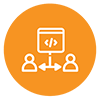A Smarter DevOps Environment Exploring Across Multiple Codes
How do you test software stability and quality while reusing multiple FLOSS components from diverse sources? How do you ensure all components will behave as expected? The DECODER central database (PKM) stores code-related knowledge: artifacts and bindings between them, obtained by generating formal specifications from informal data (like documentations) or semi-formal models out of source code. DECODER provides general-purpose languages and methods applicable to any application domain, some considering source code as natural language and applying NLP (Natural Language Processing) algorithms to it. Innovative tools are being experimented on several Java/C/C++ use cases such as IoT, AI-based image recognition, enterprise computing, Cloud computing, Big Data and middleware.

The Open Source Way